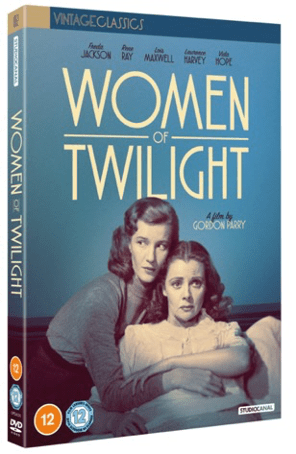
Women of Twilight was directed by the British film director and producer Gordon Parry and starred Freda Jackson, Rene Ray, Lois Maxwell (long before playing Mrs Moneypenny in the early James Bond films), and Laurence Harvey (who would go on to achieve greater stardom for his roles in the classic films, Room At The Top and The Manchurian Candidate).
The film is an adaption of the play of the same name, written by Sylvia Rayman and which had its premiere at the Regent Theatre in Hayes the previous year before going on to have an extended run in the West End. Newly restored, the film is due to have its first ever DVD, Blu-ray, and Digital release in March 27th this year via Europe’s leading film and television studio, STUDIOCANAL.
The film stays true to the central premise of Sylvia Rayman’s drama which was to draw attention to the stigma of, and wider prejudice against unmarried mothers living in postwar Britain, issues that had not previously been highlighted by British cinema. Not only does the choice of subject matter make this film groundbreaking but the fact that it features an almost all-female cast and is based upon a play written by a then 28 year old woman also places it years ahead of its time. Of further significant note is that due to its then controversial storyline and the language that was originally used in the play – words like “bastards”, “brats”, and “bitch” – Women of Twilight was the first British film to be given an X-certificate meaning that it could only be seen by anyone who was 16 years and over.
Some of the language was ultimately sanitised for the film market, but that doesn’t detract from this still being a bold and gritty piece of cinematic history. With its references to rape, infanticide, and prostitution, and given the prevailing attitudes of the day, the film was also seen as being highly controversial. It was originally intended to be part of a double bill with Cosh Boy, starring Joan Collins and another film focussing upon a different contemporary issue – this time that of juvenile delinquency – but eventually Women of Twilight was to enjoy its own individual release.
The plot stems from an unmarried and pregnant nightclub singer, Vivianne Bruce (played by Rene Ray) who can’t otherwise find anywhere to stay eventually being given lodgings in a boarding house run by Helen Allistair (Freda Jackson). We are soon disabused of this apparent act of benevolence on Helen Allistair’s part as we are introduced to the other women – a number of whom already have young children – who are already living there in what are fairly squalid conditions.
“The public isn’t interested in the sort of girls that I take in”, says Helen Allistair and as her character quickly develops in the film we see her revealed as a sinister, exploitative individual who is also involved in “baby farming”, an unfortunate euphemism for selling children on the adoption black market. In an interesting parallel with the 2022 South Korean drama film, Broker, where those involved in this illegal activity are portrayed as loveable rogues, Women of Twilight rightly characterises Helen Allistair as an evil individual preying on vulnerable women.
Freda Jackson steals the show with her convincing portrayal of the malevolent proprietress of the boarding house. It is a role that borrows much from the one she had taken six years earlier as Mrs Joe in the film Great Expectations, though there are perhaps more striking similarities with the villainous character of Mrs Danvers as played by Judith Anderson in the 1940 film, Rebecca.
Women of Twilight does have its flaws. You are left feeling that the other characters in the film are not properly developed and there is an absence of any real sub-text to the plot. And any opprobrium felt by the viewer is probably misdirected at Freda Jackson’s character rather than a wider condemnation of the issue of discrimination against unmarried mothers. But taking firmly into account the fact that Women of Twilight was made more than 70 years ago, it should be warmly applauded as a landmark film that bravely sought to destigmatize single parenthood in women.
